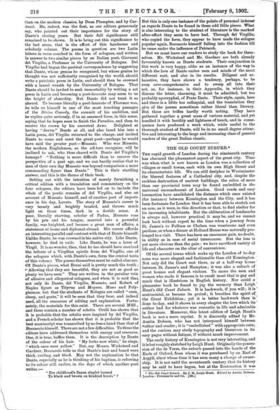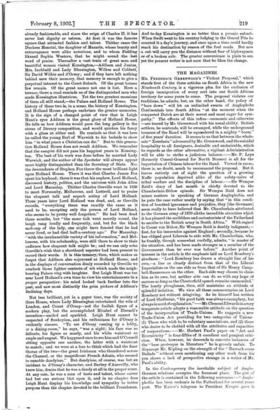THE OLD COURT SUBURB.* Taz rapid growth of London during
the nineteenth century has obscured the pleasantest aspect of the great city. Time was when what is now known as London was a collection of villages or small towns, each with its own High Street and its characteristic life. We can still decipher in Westminster the blurred features of a Cathedral city, and, despite the reckless destruction of ancient buildings, the relics of more than one provincial town may be found embedded in the universal encroachment of London. Good roads and easy locomotion have annihilated the distance which once existed (for instance) between Kensington and the City, and it has been fortunate for London that it has been able to stretch out an arm, as it were, in this direction or that, to find shelter for its increasing inhabitants. But the obliteration of landmarks is always sad, however practical it may be, and we cannot look back without regret to the time when a journey from St. James's to Fulham or Chelsea was wearisome and even perilous, or when a dinner at Holland House was naturally pro- longed to a visit. There has been an enormous gain, no doubt, in utility as in ease of social intercourse. But the loss is yet more obvious than the gain: we have sacrificed variety of life and character on the altar of convenience.
Of the several towns which make up the London of to-day none was more elegant and fashionable than old Kensington. ' Not only did the Court rest there, as at a half-way house' between St. James's and Hampton; it was also a suburb of ' great houses and elegant visitors. To name the men and,' women who made it famous is to recall most that is gay and much that is illustrious in English history. Nor could a, pleasanter book be found to jog the memory than Leigh Hunt's Old Court Suburb. It is hackwork, if you will; it is' sentimental, as became its period; it breathes the spirit of ' the Great Exhibition ; yet it is better hackwork than is done to-day, and it shows in every chapter the love which its' author had for whatever was romantic in life and admirable in literature. Moreover, this latest edition of Leigh Hunt's book is not a mere reprint. It is discreetly edited by Mr. Austin Dobson, who has not interposed himself between author' and reader; it is " embellished " with appropriate cuts; and the curious may study topography and literature in its, easy pages without fatigue, if without much improvement.
The early history of Kensington is not very interesting, and it is but roughly sketched by Leigh Hunt. Originally the posses- sion of• the de Veres, the suburb passed into the hands of the Earls of Oxford, from whom it was purchased by an Earl of since' whose time it has seen many a change of owner- ship. r It is not until the seventeenth century that its history • may be said to have begun, but at the Restoration it was
• The ow Court Suburb. By J. H. Leigh Hunt. Edited by Austin Dobson. London: Fremantle and Co., Ns.]
already fashionable, and since the reign of Charles U. it has never lost dignity or esteem. At first it was the famous square that attracted fashion and talent. Thither came the Duchess Mancini, the daughter of Mazarin, whose beauty and extravagance were alike notorious, and to whom. Fielding likened Sophia Western, that he might sound 'the last word of praise. Thereafter a vast train of • great men and beautiful women visited Kensington,—Addison and Junius • Mrs. Inchbald and Lady Blessington, Wilkes and Cobbett; Sir David Wilkie and d'Orsay ; and if they have left nothing behind save their memory, that memory is enough to give a perpetual interest to the Court Suburb. Of the great houses few remain. Of the great names not one is lost. Here a terrace, there a road reminds us of the distinguished men who made Kensington illustrious. Yet the two greatest mansions of them all still stand,—the Palace and Holland House. The history of these two is, in a sense, the history of Kensington, and Holland House perhaps enshrines the greater memories. It is the sign of a changed point of view that in Leigh Hunt's eyes Addison is the great glory of Holland House. He tells us how Addison would pace the long gallery in the stress of literary composition, and would quicken his fancy with a glass at either end. He reminds us that it was here he called the young Earl of Warwick to his bedside to show him "in what peace a Christian can die." But to this genera- tion Holland House does not recall Addison. We remember that the essayist did not pass his happiest years in Kensing- ton. The best of his work was done before he married Lady Warwick, and the author of the Spectator will always appear more highly distinguished than the Secretary of State. No; the descendants of Stephen Fox throw the most brilliant light upon Holland House. There it was that Charles James Fox spent his boyhood; there it was that his nephew, Lord Holland, discussed history, politics, and the universe with John Allen and Lord Macaulay. Thither Charles Greville went in 1838 to meet Normanby, Melbourne, and Luttrell, and to praise the eloquent talk and superb acting of Lord Holland. Three years later Lord. Holland was dead, and, as Greville records, "everything there was exactly the same as it used to be, excepting only the person of Lord Holland, who seems to be pretty well forgotten." He had been dead three months, but "the same talk went merrily round, the laugh rang loudly and frequently, and, but for the black mob-cap of the lady, one might have fancied that he had never lived, or had died half-a-century ago." For Macaulay.
with the inexhaustible variety of his information," and Mel- bourne, with his scholarship, were still. there to show to their audience how eloquent talk might be; and we can only echo Greville's wish that a shorthand reporter had been present to record their words. It is this temmoyathen, which makes us forget that Addison also sojourned 'at Holland House, and in the displays of conversation dimly recorded by Greville we overlook those lighter contests of wit which made the neigh- bouring Palace ring with laughter. But Leigh Hunt was too near Lord Holland's own time to view his entertainments. in a proper perspective : his mind looked- back further into the past, and saw most distinctly the grim picture of Addison's declining days.
Not less brilliant, yet in a gayer tone, was the society of Gore House, where Lady Blessington entertained the wits of London, and Count d'Orsay—not the foolish figure of a modern play, but the accomplished Mirabel of Disraeli's invention—smiled and sparkled. Leigh Hunt cannot be suspected of ilunkeyism, and his enthusiasm for d'Orsay is evidently sincere. "To see d'Orsay coming up a lobby, or a dining-room," be says, "was a sight; his face was so delicate, his figure so manly, and his white waistcoat so ample and august. We happened once to see him and O'Connell sitting opposite one another, the latter with a waistcoat to match ; and we were at a loss to think which had the finer thorax of the two—the great Irishman who thundered across the Channel, or the magnificent French Adonis, who seemed to ennoble dandyism." But dandyism, of course, was but an incident to d'Orsay's character, and Barbey d'Aurevilly, who knew him, denies that he was a dandy at all in the proper sense. At any rate, he was a man of taste and talent, whose career had but one serious- blot upon it, and in no chapter does Leigh Hunt display his knowledge and sympathy to better purpose than the chapter devoted to the brilliant Frenchman.
And to-day Kensington is no better than a prosaic .suburb. When Swift went to his country lodging in the Gravel Pits he counted it a day's journey, and once upon -a time could hardly reach his destination by reason of the foul roads. But now a cab will carry you the distance without fear of highwaymen or of a, broken axle. The greater convenience is plain to see, yet the present *rite? is not sure that-he likes the change.











































 Previous page
Previous page